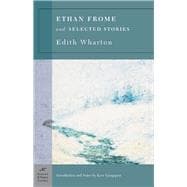From Kent P. Ljungquist's Introduction to Ethan Frome and Selected Stories
Wharton tended to measure her literary achievements against those of male writers; in her introduction, she further distinguished her efforts from previous treatments of New England by discounting her role as a mere recorder of the more superficial or external features of her setting. She thus emphasized the steps in the construction of Ethan Frome—that is, her role as a conscious literary craftsman. She noted that her initial conception derived from an academic exercise intended to polish her proficiency in the French language. Developed in Paris in 1907, the French sketch of "Ethan Frome" contained three characters (the male was named Hart) and achieved a length that encompassed two scenes, or vignettes, that survived in the published version. The fragment contained a triangular relationship among a husband, his sick wife, and the wife's niece, to whom the "Ethan-character" is attracted; but it lacked the structure that would give focus as well as depth to the narrative. Wharton eventually hit upon the device of a storyteller, but she did not choose one steeped in the lore and history of New England. Rather than a character like the herbalist and healer Mrs. Todd in Jewett's The Country of the Pointed Firs (1896), a native authority on the region's legends and values, Wharton chose someone from outside New England to narrate the story-a looker-on, an observer.
In her desire for "roundness"—Wharton seemed to resort recurrently to the terminology of the "plastic arts" or visual media—she would supplement the narrator's perspective with those of her minor characters. The fresh, acute perspective derived from the narrator's growing insight and awareness would compensate for what he lacked in inside background knowledge of the Frome household. While the device of an observer might lend "an air of artificiality" to a tale of sophisticated characters, Wharton noted, this defect might be mitigated if the narrator brought a sophisticated perspective to a tale of simple people. Her narrator would thus serve as a kind of intermediary between the reticent and reserved villagers and Wharton's readers, giving "voice" to characters nearly inarticulate or resigned to silence.
Wharton's use of an observer eases the reader's entry into Ethan's story. In the opening of the novel the narrator recaptures his first arresting glimpse of Wharton's central character, when he had been struck by Frome's physiognomy and bearing. Harmon Gow, who had driven the stage between Starkfield and other towns in the region's pre-trolley days, provides further background on Frome. From Gow the narrator learns of Ethan's age and of his reluctance to escape Starkfield because of obligations to care for his failing parents. The narrator also hears not only Gow's chilling comment on Ethan's endurance—"Ethan'll likely touch a hundred"—but also his opinion that Ethan's stay in Starkfield constituted a kind of imprisonment: "Guess he's been in Starkfield too many winters. Most of the smart ones get away". The narrator's interview of Gow develops the tale only "as far as his [Gow's] mental and moral reach permitted", and he hopes that the more educated, sophisticated Mrs. Ned Hale, with whom he is staying, will provide greater insight. He cannot cut through her reserve and reticence, however, even though she has more firsthand knowledge of the aftermath of the accident that scarred Frome's forehead. Implying a suffering too great for words, her only comment is: "It was awful".
The narrator infers that he must piece together Ethan's story from different sources, and that consequently each retelling will be a little bit different. The meaning of the story, he infers, will be found even in gaps or silences after he has accumulated a succession of hints, suggestions, and clues that surround Frome. For all the narrator's curiosity about the Frome household, this technique gives his telling an elliptical effect, a sense that much has been left unsaid or not fully articulated. When the winter snows prevent the narrator's return to Starkfield after Frome volunteers to drive him to his business appointment, he is granted a night's shelter at the farm. Enveloped by the severe storm, the narrator experiences a "soft universal diffusion more confusing than the gusts and eddies of the morning." In the "formless night" his disorientation temporarily intensifies, and "even [Ethan's] sense of direction, and the bay's homing instinct, finally ceased to serve". The narrator's perplexity and bewilderment imply a need to reorient himself, to jolt himself, so to speak, into a perspective that demands clearer sight and more acute insight. It is at this point that Wharton effects the transition back to the period of Ethan's youth. Although some critics have quarreled with the subjective nature of her narrator's perceptions, there seems little doubt that Wharton intended his narrative to be more than one version of events among others. Accordingly, it is a "vision"; in her 1922 introduction she noted: "Only the narrator has scope to see it all, to resolve it back into simplicity, and to put it in its rightful place among his larger categories."
